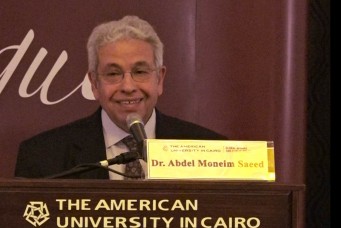Cure Rot By Exposing It To Fresh Air
I applaud the decision to withdraw the honorary degree invitation, because Ayaan Hirsi Ali’s wild and mostly false criticisms of the Islamic faith should not be honored with a degree from a quality university like Brandeis.
One of the most fascinating but problematic recent incidents on the extent of allowable free speech in the United States took place this week when Brandeis University withdrew an invitation to the Somali-Dutch-American anti-Islamic firebrand Ayaan Hirsi Ali to give a speech and receive an honorary degree. After the university administration issued the invitation, over 80 Brandeis faculty sent a letter to the school’s president demanding the withdrawal of the invitation—which is what happened. The university invited her instead to speak on campus and engage in a public dialogue, which she declined.
I applaud the decision to withdraw the honorary degree invitation, because her wild and mostly false criticisms of the Islamic faith should not be honored with a degree from a quality university like Brandeis. Yet the decision is problematic because it muddies the line that separates clearly unacceptable public statements from those which are simply aggressive and hurtful. Someone who makes a living spewing the filthy rhetoric that Ayaan Hirsi Ali does will always find some place to speak on a college campus. But her ideas clash violently with the truth-seeking mission of a university—because her accusations against Islam as a whole are so extreme and false that they fall out of the category of intellectual debate and slip into the gutter of racist slander.
The faculty, in their letter to Brandeis President Fred Lawrence, said they were “shocked and dismayed, owing to her virulently anti-Muslim public statements. We are saddened that Brandeis would choose to honor such a divisive individual at commencement, a moment of unity for the Brandeis community.”
Among the cited comments made by Hirsi Ali were calling Islam “the new fascism” and saying that Islam must be “defeated.” They noted that David Cohen quotes Ms. Hirsi Ali as saying: “Violence is inherent in Islam—it’s a destructive, nihilistic cult of death. It legitimates murder. The police may foil plots and freeze bank accounts in the short term, but the battle against terrorism will ultimately be lost unless we realise that it’s not just with extremist elements within Islam, but the ideology of Islam itself…. Islam is the new fascism” (London Evening Standard, 2-7-07).
The coments also noted that Rogier van Bakel quotes her as follows: “Jews should be proselytizing about a God that you can quarrel with. Catholics should be proselytizing about a God who is love…. Those are lovely concepts of God. They can’t compare to the fire-breathing Allah who inspires jihadism and totalitarianism.” Van Bakel notes religions’ ability to bring about change for good: “Do you think Islam could bring about similar social and political changes?” Ms. Hirsi Ali responds, “Only if Islam is defeated.” Van Bakel asks, “Don’t you mean defeating radical Islam?” To that she responds, “No. Islam, period.” (Reason, 11-07)
Hirsi Ali is one of a handful of Muslim women who have left their home societies and set up shop abroad, in the United States mostly, where they spend much time trash-talking Islam as a religion of violence, hatred, and cruelty and violence to women. Of course, there are many Muslim individuals who exhibit those traits and even worse ones, but making Islam itself the problem and calling for an Islamic reformation in order to copy the Western trajectory strike me as simultaneously simplistic, insulting and just factually wrong.
The problem with this kind of hate-talk, especially in societies like the United States where anger against Islam and Muslims is high due to the Sept. 11, 2011 and other attacks, is that it creates an environment in which all Muslims become permissible targets of violent racists and hate-mongers; then it becomes acceptable to talk about other groups—like Chinese, Jews, Italians or Hispanics—in the same manner. The problem in the Brandeis case was that the university extended the invitation to her before knowing enough about her vocation of anti-Islamic hate-mongering and intellectual hooliganism. The honorary degree should never have been offered.
Brandeis should and did invite her to engage in a campus debate with others. Hateful and false as her views are, they should be banished from the public sphere not by executive fiat, but by the ridicule and factual retort that they would generate when presented in public. She draws attention initially because she is an entertainer whose product is hate and venom, in a wounded American society that will accept almost any criticism of Islam or Muslims in its elusive quest to understand why it was attacked by a handful of Muslim terrorists among a world of 1.4 billion non-violent Muslims. Intellectual freak shows like hers eventually lose their appeal, because they are exposed as hollow, false, and hurtful—not only to Muslims, but to American society and the world as a whole.
Rami G. Khouri is Editor-at-large of The Daily Star, and Director of the Issam Fares Institute for Public Policy and International Affairs at the American University of Beirut, in Beirut, Lebanon. You can follow him @ramikhouri.
Copyright © 2014 Rami G. Khouri—distributed by Agence Global



